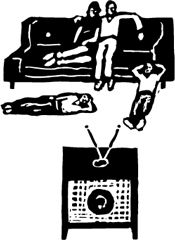
A good portion of our time goes into make decisions. Sometimes these decisions are big, important things, but often they are mundane simple things. Most decisions require some type of investment in time. Let’s look at an example:
If I’m in a video store trying to pick out a movie to watch that evening, there is a certain amount of time that will go into evaluating the options and selecting a video. From personal experience, this process can take 10 to 20 minutes, easily.
For most people, this 10 to 20 minutes is completely wasted time because at some point in the last 6 months they have already made a decision about a movie they would like to see, but they just don’t remember. When a friend tells you about a movie they saw in the theater and you decide you want to rent it, you’ve made a decision to see that movie. If you remembered that decision when you entered the movie store, it would just be a matter of finding it and renting it.
By simply keeping a list of movies that you want to watch, you can
capture your decisions when they are made instead of making them again
when you need to use the information the decision produced (in this
case, the name of a movie).
Another example: I frequently come up with ideas where I wonder “is it
possible to create a business to do X profitably?” Often such a
question is followed with 30 to 45 minutes of poking around on the web
checking prices, making several calculations, and doing some searches
to see what other similar businesses exist. Along the way, I make
several preliminary decisions about the best way such a business could
be organized, who the best suppliers would be, etc. Many times this
information is just lost. I end up with a good idea of whether the business
could be profitable, but the data used to make that decision is gone.
I’ve started documenting my findings in simple one pages summaries.
They aren’t anything complicated but they contain a good deal of basic
decisions. For example, a recent idea promoted me to decide what web
hosting company I would use if I needed a tremendous amount of
bandwidth, the most cost effective way to take payments over the
internet, and the best way to configure a particular piece of software
for use by multiple users.
Here are a few other areas where documenting decisions that are made in advance can help save you time in the future:
- Books to read.
- People to take to lunch.
- Movies to see.
- Restaurants to try.
- Business ideas.
- Fun things to do with your significant other.
- People to write letters to.
- Topics for blog entries.
- Gift ideas.
By keeping track of these things as you think of them, you can improve
your ability to make decisions in the future. Having a list of 5
restaurants that you’ve already decided you’d like to try drastically
cuts the amount of time spent trying to come up with a decision for
dinner.
We make small decisions on things all the time. Capturing these little,
seemingly insignificant decisions can drastically reduce the amount of
time we spend trying to recreate information produced by these
decisions.
Originally published on December 10, 2005.
What you describe is “time shifting” a decision from one point in time to another. Sort of like Tivo or podcasting.
Try noting on each list your criteria for including the item near the top, e.g., Jack’s favorite movies. It’s the imformation about the decision that may wind up being more important,
I keep a personal wiki on a pen drive using GTDTiddlyWiki.
http://shared.snapgrid.com/index.html
It’s been very effective for me, since I’m compelled to write my thoughts anyway. Now I can keep them in something more cohesive and organized than a stack of notebooks.
Beyond that I bookmark everything of use to me in del.icio.us. This has helped me have just the right information available when I need it.
I use the task reminder in my SE K750i to schedule calls which give me a reminder 5 minutes before the set time. The name and number pops up ask if I wish to dial now!
I use Netflix, Shelfari, Amazon.com, and Ma.gnolia.com to document my decisions.
I keep two little lists in my wallet. One is a list of authors I want or like to read for when I go to the library. The other is a list of inexpensive wines I want to try or that I have found I like.
This is a GREAT application for Jott http://www.jott.com. I use it to document my thoughts and decisions without having to type them into a log.